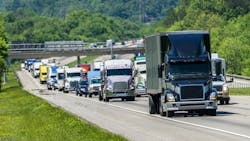For 22 years, the American Transportation Research Institute has collected and processed data about ongoing truck bottlenecks. This data “is used to quantify the impact of traffic congestion on truck-borne freight at over 325 specific locations,” ATRI said.
This year’s report found that the areas that typically have congestion are still congested, but we also see more congestion. So basically, congestion in the unusual places, just more of it.
Traffic congestion and bottlenecks cost the trucking industry money but also harm the environment because the bottlenecks lead to excess carbon emissions every year. Chris Spear, president of the American Trucking Associations, said congestion “adds $95 billion to the cost of freight transportation and [generates] 69 million metric tons of excess carbon emissions every year.”
He also said the DOT should make it a priority to increase freight efficiency and alleviate bottlenecks.
If you want specifics on where the bottlenecks are, look at the summary of ATRI’s findings. Fort Lee, New Jersey, once again grabbed the top spot, but the top 10 bottlenecks were spread across several areas, including Chicago, Houston, Atlanta, Los Angeles, and Nashville.
See also: ATRI releases annual list of top 100 truck bottlenecks
There is not much we can do about congestion that results from growth in certain parts of the country. Expanding roads to meet increased demand will, at first, likely result in even more delays as construction crews shut down lanes or even whole sections of highways to make improvements.
I think each fleet needs to analyze the impact of congestion delays on their operation and perhaps consider rerouting loads around some of the bottlenecks. It might not be possible, but sometimes the shortest distance between two points is not a straight line, especially if road speeds are dramatically reduced because of bottlenecks or trucks sitting for long periods because of backups.
Route optimization is one of the operational practices that can help fleets improve their freight efficiency. When optimizing routes, I suggest fleets factor in the time, cost, and environmental impact of any bottleneck areas their drivers must navigate to do their job.
Also, look at the times of day your trucks are on the roads. Work with customers to see if loads can be delivered earlier or later so drivers can avoid certain roads during peak periods of congestion.
At the same time, we need to ensure that highways are well maintained so freight can be delivered as efficiently as possible no matter what road it travels.
About the Author

Michael Roeth
Executive Director
Michael Roeth is the executive director of the North American Council for Freight Efficiency. He serves on the second National Academy of Sciences Committee on Technologies and Approaches for Reducing the Fuel Consumption of Medium and Heavy-Duty Vehicles and has held various positions with Navistar and Behr/Cummins.
